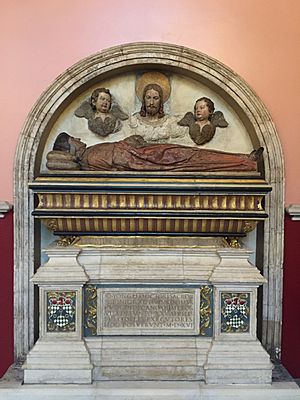John Yonge facts for kids

John Yonge (born around 1465 – died April 25, 1516) was an English church leader and a diplomat. He also held an important job called the Master of the Rolls from 1507 until he passed away.
Contents
Who Was John Yonge?
John Yonge was born in a place called Upper Heyford, Oxfordshire. He went to school at Winchester and then to New College, Oxford. He became a "fellow" at Oxford in 1485, which means he was a senior member of the college.
He was probably the son of John Yonge, who was the Lord Mayor of London in 1466. John Yonge became a priest in 1500. He held several church positions, including being an Archdeacon of Barnstaple.
John Yonge's Diplomatic Missions
John Yonge was also a skilled diplomat. This means he represented England in talks with other countries.
- In 1504, he went on his first mission to arrange a trade agreement with the leader of Austria.
- In 1506, he traveled to the Low Countries (modern-day Belgium and Netherlands). He was working on plans for King Henry VII to marry Margaret of Savoy.
In 1507, John Yonge became the Master of the Rolls. This was a very important legal job in England. He continued to work on many diplomatic missions in the years that followed.
Working with Kings and Important People
In 1513, John Yonge was one of the ambassadors who helped create the Holy League. This was a group of countries that joined together. He even went with King Henry VIII during the fighting that followed.
John Yonge was good friends with Dean Colet, another important church leader. He also wrote letters to Erasmus, a famous scholar.
In 1514, he became the dean of York, taking over from Wolsey, who later became a very powerful cardinal. In 1515, John Yonge helped renew a peace treaty with King Francis I of France. In the same year, he became the Archdeacon of Barnstaple again.
John Yonge's Death and Memorial
John Yonge passed away in London on April 25, 1516. His tomb monument, which shows a statue of him, is located in what used to be the Rolls Chapel. Today, this chapel is part of the Maughan Library at King's College London.
 | Selma Burke |
 | Pauline Powell Burns |
 | Frederick J. Brown |
 | Robert Blackburn |

